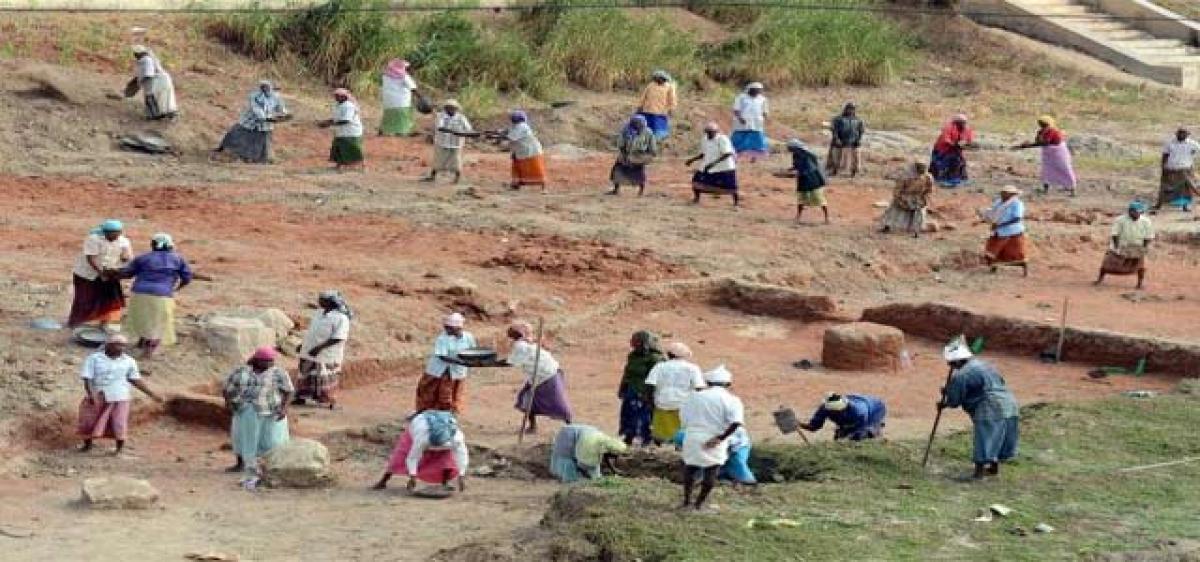Faulty execution pushes NREGS off-track

It is that time of the year when the Mahatma Gandhi National Rural Employment Guarantee Scheme (MGNREGS) works are supposed to start in rural areas.
Hyderabad: It is that time of the year when the Mahatma Gandhi National Rural Employment Guarantee Scheme (MGNREGS) works are supposed to start in rural areas.
After successive years of drought coupled with heavy September rains and demonetisation in December, farmers are left with a little if not nothing, to take care of the basic needs of their families.
However, even a decade after the revolutionary scheme was introduced to address the basic human needs, its shoddy implementation through the years has proved that some lessons are never learnt.
Nizampet is the newly-formed mandal in Medak district, where identification of works has not yet been done according to the workforce there.
No gram sabha has been held till date and it has already been five months since any work was undertaken under the scheme.
“Officials in our mandal are not giving any information on measurement and quantity of work. There is also a difference in the amount being paid to normal and differently-abled people,” said Ramaswamy, a resident of Nizampet.
Last year, Haritha Haram works were also undertaken using NREGS funds by employing labour for digging pits and tree-guard works.
Labourers in Nizampet alleged that they were being paid Rs 20 instead of Rs 50 for the plantation works. Farmers have been getting below Rs 70 as wages for other works covered by the scheme.
Even the Haritha Haram wages have not been not paid for the past seven months, according to Balachander, a resident of Nizampet.
“20-25 groups are yet to get paid for the work they have done. No new job card was given, though it was promised during social audit which was held a few months ago. There are 100 new job seekers waiting for job cards in our village,” he pointed-out.
Situation is not any different in Gajwel, the Chief Minister’s Assembly constituency. For the past 5-6 months, workers were not paid their wages and officials have been paying wages only as per general measurement.
Even during Haritha Haram programme in June 2016, works were carried-out in a hurry without any estimation. Gram sabhas were held as a formality with just a few people in attendance.
According to the people of Kasulabad village in Mirdoddi mandal of Siddipet constituency, only nursery works were being undertaken in the area. No land levelling works were in progress through NREGS.
In Sangem mandal of Warangal rural, workers were not paid for canal and soak-pit work for three months and there has been no disbursement of amount for construction of Individual House-hold Latrines (IHHLs).
Field Assistants are unable to provide work due to shortage of money due to demonetisation. Situation in Anantaram village in Geesukonda mandal of Warangal rural is such that if NREGS works are not started immediately, people will migrate to other areas.
Worse is the situation in Mahbubnagar, where 396 gram panchayats (according to a survey done by NGOs inFebruary 2016).
“One of the main reasons for poor implementation of NREGS is that there is no monitoring mechanism in place.
Even if work estimates are given to farmers, when they go to the specified field to work, they would find that the specified work is no more available there.
Workers return without working and then officials say labourers are either showing no interest in work or that they don’t work properly,” commented Chakri, who is a resource person working on NREGS implementation in Mahbubnagar district.
“There is no tracking system for job card applications. Demand for work is there, but no receipt is given because there are no receipt books with the field assistants.
Central government pays administrative expenses to cover the salaries of field assistants, but the State government is not making judicious use of it,” he added.
On November 26, 2014, the Telangana government had passed a resolution in the Assembly observing that implementation of NREGS scheme only in 2,500 mandals across the country was wrong and had also wondered if the Centre was trying to close down the scheme which would adversely affect Dalits and women across the country.








